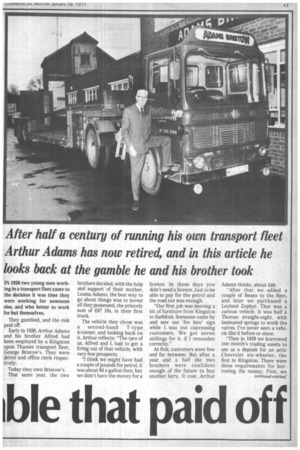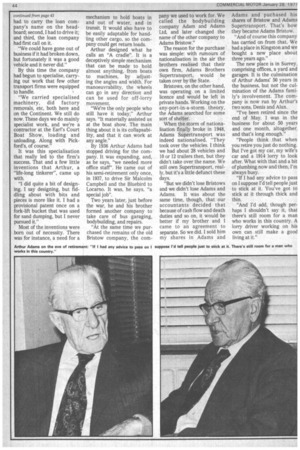After half a century of running his own transport fleet
Page 47

Page 48

If you've noticed an error in this article please click here to report it so we can fix it.
Arthur Adams has now retired, and in this article he looks back at the gamble he and his brother took
IN 1926 two young men working in a transport fleet came to the decision it was time they were working for someone else, and who better to work for but themselves.
They gambled, and the risk paid off.
Early in 1926, Arthur Adams and his brother Alfred had been employed by a Kingston upon Thames transport fleet, George Bristow's. They were driver and office clerk respectively.
Today they own Bristow's. That same year, the two brothers decided, with the help and support of their mother, Louisa Adams, the best way to go about things was to invest all they possessed, the princely sum of £47 10s, in their first truck.
The vehicle they chose was a second-hand T-type 4-tonner, and looking back on it, Arthur reflects: "The two of us, Alfred and I, had to get a living out of that vehicle, with very few prospects.
"I think we might have had a couple of pounds for petrol, it was about 9d a gallon then, but we didn't have the money for a licence. In those days you didn't need a licence. Just to be able to pay for the petrol and the road tax was enough.
'Our first job was moving a bit of furniture from Kingston to Surbiton. Someone came by and saw our 'for hire' sign while I was out canvassing customers. We got seven shillings for it, if I remember correctly."
At first, customers were few and far between. But after a year and a half the two brothers were confident enough of the future to buy another lorry. It cost, Arthur Adams thinks, about £40.
"After that we added a couple of Beans to the fleet, and later we purchased a Leyland Zephyr. That was a curious vehicle. It was half a Thomas straight-eight, with laminated springs to work the valves. I've never seen a vehicle like it before or since.
"Then in 1929 we borrowed one month's trading assets to use as a deposit for an artic Chevrolet six-wheeler, the first in Kingston. There were three requirements for borrowing the money. First, we had to carry the loan company's name on the headboard; second, I had to drive it; and third, the loan company had first call on it..
"We could have gone out of business if it had broken down, but fortunately it was a good vehicle and it never did."
By this time the company had begun to specialise, carrying out work that few other transport firms were equipped to handle.
"We carried specialised machinery, did factory removals, etc, both here and on the Continent. We still do now. These days we do mainly specialist work, and we're a contractor at the Earl's Court Boat Show, loading and unloading. Along with Pickford's, of course."
It was this specialisation that really led to the firm's success. That and a few little inventions that Arthur, a "life-long tinkerer", came up with.
"1 did quite a bit of designing. I say designing, but fiddling about with bits and pieces is more like it. I had a provisional patent once on a fork-lift bucket that was used for sand dumping, but I never pursued it."
Most of the inventions were born out of necessity. There was for instance,. a need for a mechanism to hold boats in and out of water, and in transit. It would also have to be easily adaptable for handling other cargo, so the company could get return loads.
Arthur designed what he calls an "A cradle". It is a deceptively simple mechanism that can be made to hold almost anything, from boats to machines, by adjusting the angles and width. For manoeuvrability, the wheels can go in any direction and can be used for off-lorry movem en t.
"We're the only people who still have it today," Arthur says. "It materially assisted us at the boat show. The main thing about it is its collapsability, and that it can work at any angle."
By 1936 Arthur Adams had stopped driving for the company. It was expanding, and, as he says, "we needed more office staff". He came out of his semi-retirement only once, in 1937, to drive Sir Malcolm Campbell and the Bluebird to Locamo. It was, he says, "a special job".
Two years later, just before the war, he and his brother formed another company to take care of bus garaging, bodybuilding, and repairs.
"At the same time we purchased the remains of the old Bristow company, the corn pany we used to work for. We called the bodybuilding company Adam and Adams Ltd, and later changed the name of the other company to Adams Bristow."
The reason for the purchase ' was simple: with rumours of nationalisation in the air the brothers realised that their own firm, Adams Brothers Supertransport, would be taken over by the State.
Bristows, on the other hand, was operating on a limited licence and would be left in private hands. Working on the any-port-in-a-storm theory, the Adams searched for some sort of shelter.
When the storm of nationalisation finally broke in 1948, Adams Supertransport was indeed nationalised. "They took over the vehicles. I think we had about 28 vehicles and 10 or 12 trailers then, but they didn't take over the name. We still own Supertransport, really, but it's a little defunct these days.
"But we didn't lose Bristows and we didn't lose Adams and Adams. It was about the same time, though, that our accountants decided that because of cash flow and death duties and so on, it would be better if my brother and I came to an agreement to separate. So we did. I sold him my shares in Adams and Adams and puchased his shares of Bristow and Adams Supertransport. That's how they became Adams Bristow, "And of course this company has carried on from that. We had a place in Kingston and we bought a new place about three years ago."
The new place is in Surrey, comprising offices, a yard and garages. It is the culmination of Arthur Adams' 50 years in the business, but not the culmination of the Adams family's involvement. The company is now run by Arthur's two sons, Denis and Alan.
"I've been retired since the end of May. I was in the business for about 50 years and one month, altogether, and that's long enough."
"People think that when you retire you just do nothing. But I've got my car, my wife's car and a 1914 lorry to look after. What with that and a bit of plumbing now and then, I'm always busy.
"If I had any advice to pass on I suppose I'd tell people just to stick at it. You've got to stick at it through thick and thin.
"And I'd add, though perhaps I shouldn't say it, that there's still room for a man who works in this country. A lorry driver working on his own can still make a good living at it."


































































































